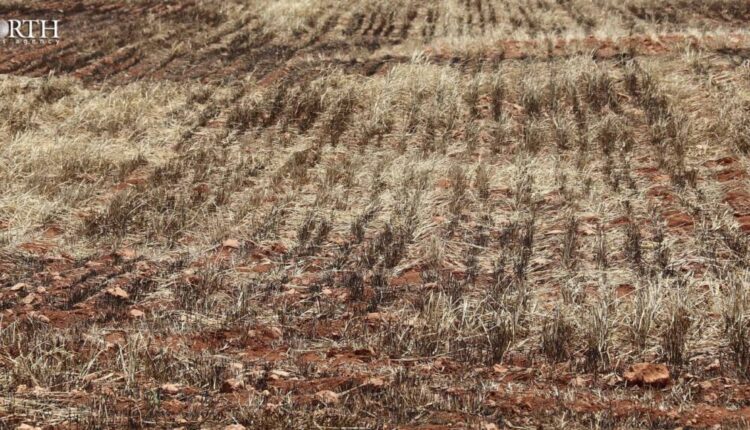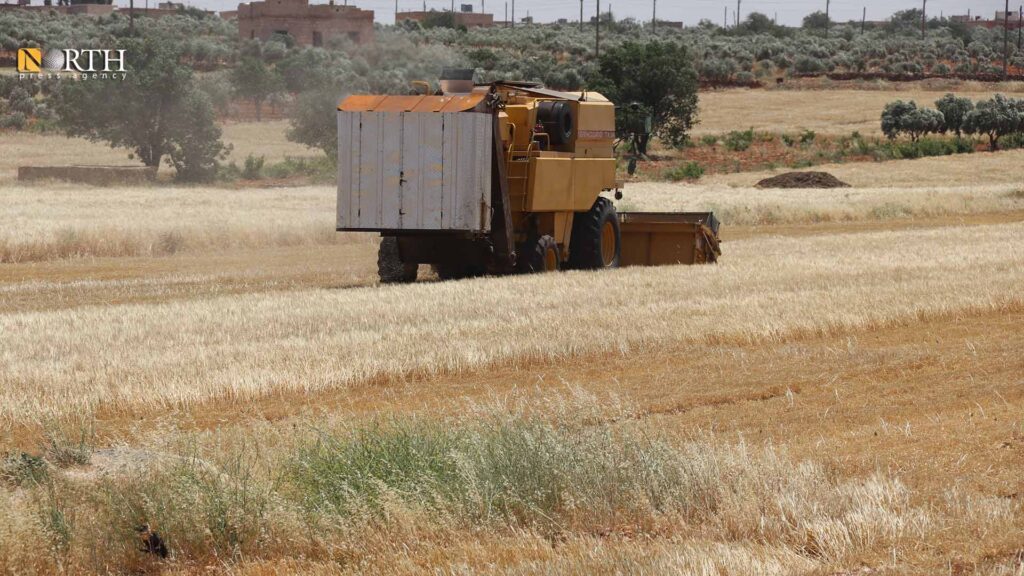
ALEPPO, Syria (North Press) – Mazen Ahmad, a 51-year-old farmer from Hasajek village in Aleppo northern countryside, fears that he will lose additional areas of his 17-hectare land planted with wheat, barley, coriander and black seed due to Turkish shelling.
On May 9, one hectare of wheat was burned from that area after the Turkish forces and their affiliated armed opposition factions, also known as Syrian National Army (SNA), shelled it with artillery. Three and a half hectares of barley belonging to another farmer in the village were also burned in that attack.

According to farmers in that region, the wheat and barley crops need another two weeks to be ready for harvesting. Some farmers have already been harvesting, for fear of their lands to be burned down by the shelling.
However, with the area being shelled from time to time, the cultivated lands around Hasajek, which are about 250 hectares, are threatened to be burned.
“We suffered a lot that day until we were able to extinguish the fire that broke out on my land and my neighbor’s, which is a source of livelihood for our families,” the farmer said.
The man’s lands are located between the villages of al-Hasiya and Hasajek.
The villages of Qol Suruj, Hasajek, Qaraj Hasajek, al-Wardiya, Tel al-Madiq, Smouqa, Hassin, Fafin and al-Muslimiyah are located near the areas held by the Turkish forces and SNA factions in the northern countryside of Aleppo.
Two weeks ago, the Turkish forces have escalated its shelling on Aleppo northern countryside.
The man recalls 2016 when he lost 14 hectares of barley, and only three hectares of land survived after it was caught on fire during the clashes between the Islamic State Organization (ISIS) and the Free Syrian Army (FSA).
Financial losses
Statistics of the Agriculture Board of Afrin region which is currently operating in the northern countryside of Aleppo indicated that the fire has so far devoured 35 hectares of the total land in the area, 25,000 hectares are planted with wheat, barley, vegetables, cumin, coriander and black seed.
Most of the burned areas this year belong to residents of the villages of Hasajek, Sheikh Issa, Tel Rifaat, al-Hasiya and Qol Suruj.
Last year, nearly 100 hectares of crops were burned, according to the Board.
“We have not decided whether those affected people will be compensated or not,” Bassem Othman, co-chair of the Board said.
However, he mentioned that the Board is ready to receive entire crop of wheat from farmers at a price of 2,200 SYP per kilogram (about 55 cents), and barley at 1,600 SYP, according to what the Autonomous Administration of North and East Syria (AANES) has determined.
The AANES was first formed in 2014 in the Kurdish-majority regions of Afrin, Kobani and Jazira in northern Syria following the withdrawal of the government forces. Later, it was expanded to Manbij, Tabqa, Raqqa, Hasakah and Deir ez-Zor after the Syrian Democratic Forces (SDF) defeated ISIS militarily.
Agriculture is considered the main source of income of the northern countryside of Aleppo, especially wheat and barley crops, in addition to vegetables, cumin, coriander, black seed, legumes, olive groves, pistachios and vineyards.
Due to the lack of rainfall and the drying up of the Queiq River, crops, especially rainfed wheat and barley have been negatively affected.
“30% of the cultivated lands were affected, compared to last year,” according to Othman.
“What is our fault?”
In the same village, Wais Hantaya, 55, anxiously awaits his turn to harvest his barley crop. The harvester told him that he would come to him as soon as the lands close to the lines of contact were completed.
Hantaya, who owns two hectares of rainfed barley, said that his crop is not fully ripe, but “the frequent shelling forces us to harvest it.”
He added, “if a shell falls, it will take a year’s fatigue with it in a few moments, and the land will turn to ash.”
But he is afraid that the barley grains will rot, especially since it has not dried up yet.
The man expresses his suffering during the years of the Syrian war, as he owned a farm containing 45 cows, which was destroyed in the bombardment of a Russian airstrike on ISIS headquarters near his farm.
“We are destroyed, we have nothing at all,” he added.
Since then, Hantaya, a father of four, has depended on farming his land to secure his family’s livelihood amid the difficult living conditions he faces in the city of Aleppo.
Due to poor rainfall, drying of wells, high cost of fuel and high cost of agriculture, Hantaya only cultivated one piece of his land.
The man asks, “What is our fault? Why should we be deprived of our lands? We are just simple peasants.”
